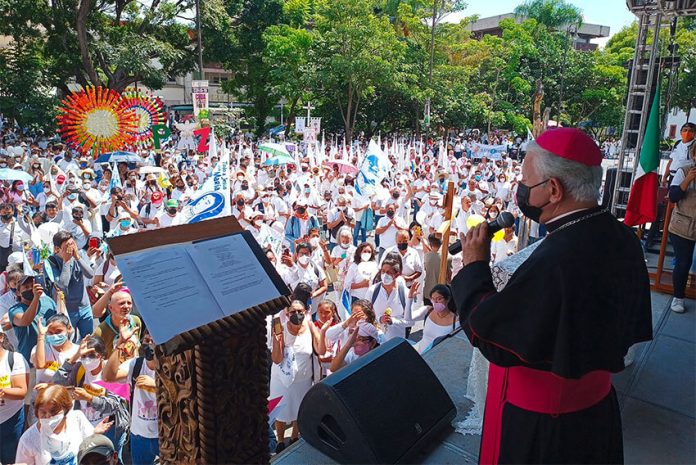The secretary general of Mexico’s bishops’ association has added his voice to the criticism of the federal government’s non-confrontational security strategy, which purports to address the root causes of violence through the delivery of social programs.
“The abrazos, no balazos [hugs, not bullets] strategy hasn’t worked,” said Ramón Castro Castro, secretary general of the Episcopal Conference of Mexico and bishop of the diocese of Cuernavaca.
Speaking after the eighth “walk for peace” in Cuernavaca, Morelos, on Saturday, Castro said “it will never be right or legal” for a government to shirk its responsibility to provide “security and social peace” to citizens. “That’s why [governments] have power and [access to] legitimate use of force,” he said. “Abrazos, no balazos is demagoguery and to some extent complicity. [True] authorities don’t fail, they fulfill their function, they guarantee security with deeds.”
The high levels of violence in Mexico are partially due to the fact there are thousands of people with “broken hearts, fractured lives and alienated and manipulated minds,” Castro said. The bishop railed against the offering of “easy money” to young people, a remark which partially appeared to be a reference to the government’s provision of payments via programs such as the Youth Building the Future apprenticeship scheme.
“We must know how to say no to easy money whether it comes from organized crime, a [political] party or the government. Let’s not be prisoners to economic subsidy,” Castro said.
To support his claim that abrazos, no balazos has failed, the bishop pointed to the results of a recent survey that found that 57% of people believe the strategy hasn’t worked. He noted that 62% of respondents said that protecting the lives of criminals by avoiding confrontations with them was not the right thing to do. President López Obrador declared in May that his government looks after criminals by avoiding armed clashes with them.
Castro said that the results of the survey, which was conducted by the polling firm Mitofsky, add weight to the call from Senator Ricardo Monreal, the ruling Morena party’s leader in the upper house, for the government’s security strategy to be reviewed.
The bishop’s criticism came less than two weeks after two priests were murdered in a church in the Sierra Tarahumara region of Chihuahua. Heads of Jesuit universities subsequently slammed past and present governments for failing to combat violence in Mexico, with one describing the country as a failed state where the law of the jungle prevails.
Castro joins a long list of critics of the government’s strategy, among whom are opposition politicians, former presidents, a former vice president of Colombia and a U.S. government anti-narcotics commission.
López Obrador on Monday reiterated his support for the non-confrontational security approach, asserting that “we’re convinced that violence can’t be confronted with violence.”
“… We’re convinced that it was a serious mistake, a crime, to have declared war on [organized] crime at the beginning of the [Felipe] Calderón government,” he said. “… We’re attending to the causes of violence. That wasn’t done [before]. … With all respect, a priest, a bishop, a minister can’t say that violence must be responded to with violence, … that’s an eye for an eye, a tooth for a tooth. This doesn’t mean that there is tolerance [of crime], we arrest criminals every day and when there are no [other] options, confrontations occur,” López Obrador said.
It’s “very easy” to say “from the pulpit or from academia” what kind of security strategy should be carried out, he said.
The president also said that the government has a good relationship with the Catholic Church and other churches before claiming that the “conservatives” – an umbrella term he uses to describe his political opponents and critics – are trying to create a conflict between the two parties. “Our adversaries … now want us to get into a controversy with the churches,” López Obrador said. “… [But] we identify very well with Pope Francis and we also have very good relations with ministers of other churches,” he said.
With reports from El Universal, Animal Político and Reforma
